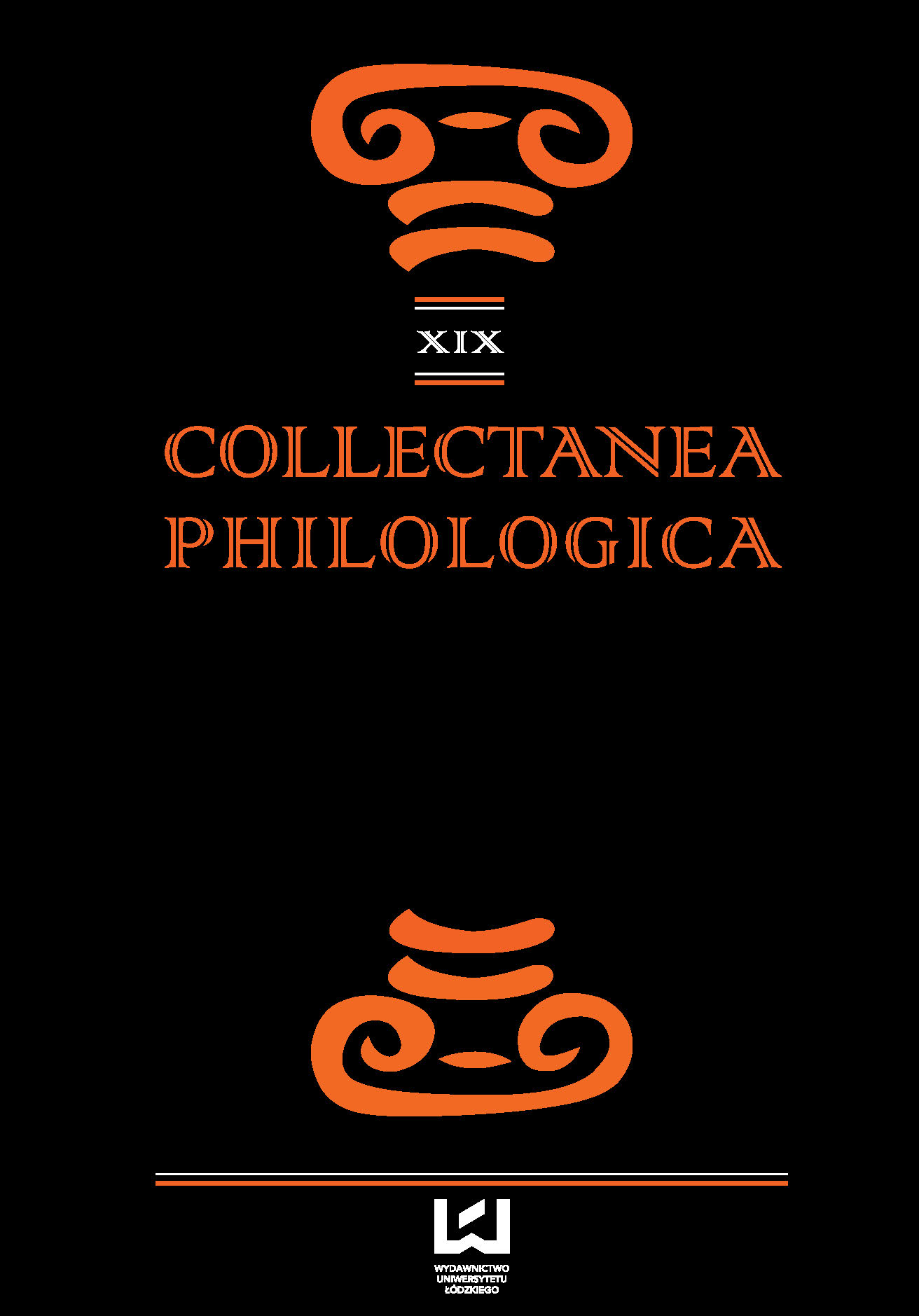Scholia – problem przekładu
DOI:
https://doi.org/10.18778/1733-0319.19.02Słowa kluczowe:
scolio, lettertura greca, tragedia greca, Sofocle, EuripideAbstrakt
Przedmiotem rozważań jest problem tłumaczenia scholiów, rozpatrywany zarówno jako proces dokonywania przekładu, jak i jego wynik, czyli przetłumaczony tekst2. W pierwszym przypadku zwrócę przede wszystkim uwagę na specyfikę pracy tłumacza scholiów i problemy, z jakimi się on styka; w drugim zaś – na potencjał informacyjny zawarty w samych scholiach (Nünlist 2009).
Bibliografia
Angold M. (1993). Cesarstwo bizantyńskie 1025–1204. Historia polityczna, przeł. Władysław Brodzki. Wrocław: Wydawnictwo: Zakład Narodowy im. Ossolińskich.
Google Scholar
Atkins J.W.H. (1934). Literary Criticism in Antiquity: A Sketch of Its Development, vol.1–2. Cambridge: Cambridge University Press.
Google Scholar
Bowers F. (1959). Textual and Literary Criticism. Cambridge: Cambridge University Press.
Google Scholar
Browning R. (1997). Cesarstwo Bizantyńskie, przeł. G. Żurek. Warszawa: PIW.
Google Scholar
Cardini F., Montesano M. (2006). Storia medieale. Firenze: Le Monnier.
Google Scholar
Caretti L. (1955). Filologia e critica. Milano–Napoli: Ricciardi.
Google Scholar
Catford J.C. (1965). A linguistic Theory of Translation. London: Oxford University Press.
Google Scholar
Cavallo G. (ed.) (1975). Libri, editori e pubblico nel mondo antico: guida storica e critica. Roma– Bari: Editori Laterza.
Google Scholar
Chiżyńska K. (2012) Scholia Medicea in Æschyli „Persas” – opracowanie, przekład, komentarz, (diss.). Łódź: Uniwersytet Łódzki.
Google Scholar
Dain A., Mazon P. ed. (1958). Sophocle, Ajax vol. 2. Paris: Les Belles Lettres, (repr. 1968 (1st edn. rev.): 10–59.
Google Scholar
Dawe R.D. (1973). Studies on the Text of Sophocles, vol 1: The manuscripts and the text. Laiden: Brill.
Google Scholar
Dickey E. (2007). Ancient Greek Scholarship. A Guide to Finding, Reading and Understanding Scholia, Commentaries, Lexical and Grammatical Treatises from their Beginnings to the Byzantine Period. An American Philological Association Book. New York: Oxford University Press.
Google Scholar
Euripidis Fabulae, ed. G. Murray, t. I: Cyclops, Alcestis, Medea, Heraclidae, Hippolytus, Andromacha, Hecuba, Oxonii 11902, 21947; t. II: Supplices, Hercules, Ion, Troiades, Elektra, Iphigenia Taurica, 11904, 21937; t. III: Helena, Phoenissae, Orestes, Bacchae, Iphigenia Aulidensis, Rhesus, 11909, 31978.
Google Scholar
Günther H.C. (1995). The Manuscripts and the Transmission of the Paleologan Scholia on the Euripidean Triad. Stuttgart: F. Steiner Verlag.
Google Scholar
Hejwowski K. (2004). Kognitywno-komunikacyjna teoria przekładu. Warszawa: PWN.
Google Scholar
Jurewicz O. (1984). Historia literatury bizantyńskiej. Wrocław: Ossolineum.
Google Scholar
Jurewicz O. (ed.) (2002): Encyklopedia kultury bizantyńskiej. Warszawa: Wydawnictwo Uniwersytetu Warszawskiego.
Google Scholar
Malzan G. (1908). De Scholiis Euripideis quae ad res scaenicas et ad histriones spectant. Darmastadt: Roether.
Google Scholar
Małunowiczówna L. (1960). Wstęp do filologii klasycznej wraz z metodologią pracy umysłowej i naukowej. Lublin: Towarzystwo Naukowe KUL.
Google Scholar
Nauck A. ed. (1889). Tragicorum Graecorum fragmenta. Leipzig: Teubner, (repr. 1964. Hildesheim: Olms).
Google Scholar
Neubert A., Shreve G.M. (1992). Translation as Text. Kent/London: The Kent State UP.
Google Scholar
Nida E.A. (1964). Toward a Science of Translating. Laiden: Brill.
Google Scholar
Nünlist R. (2009). The Ancient Critic at Work: Terms and Concepts of Literary Criticism in Greek Scholia. Cambridge: Cambridge University Press.
Google Scholar
Ojcewicz G. (1991). Podstawy translatoryki. Gdańsk: Uniwersytet Gdański.
Google Scholar
Ostrogórski G. (2008). Dzieje Bizancjum. Warszawa: PWN.
Google Scholar
Pieńkos J. (2003). Podstawy przekładoznawstwa. Od teorii do praktyki. Kraków: Zakamycze.
Google Scholar
Pisarska A., Tomaszewicz T. (1988). Współczesne tendencje przekładoznawcze. Poznań: Wydawnictwo Uniwersytetu Adama Mickiewicza.
Google Scholar
Rachel G. (1998). Słownik cywilizacji greckiej, przekł. E. Papuci-Władyka. Katowice: Wydawnictwo „Książnica”.
Google Scholar
Schwartz E. ed. (1887). Scholia in Euripidem (scholia vetera), 2 vols. Berlin: Reimer, 1:1887; 2:1891 (repr. De Gruyter, 1966): Scholia in Orestem: vol. 1, pp. 94–241.
Google Scholar
Snell-Hornby M. (1995). Translation Studies. An Integrated Approach. Amsterdam / Philodelphia: John Benjamins.
Google Scholar
Wilson N.G. (1983). Scholars of Byzantium. London: Duckworth.
Google Scholar
Wilson N.G. (1983a). ‘Scoliasti e commentatori’. Studi Classici e Orientali (33), 83–112.
Google Scholar












